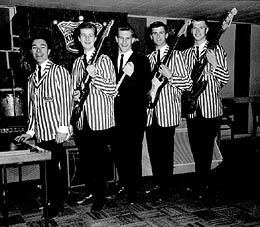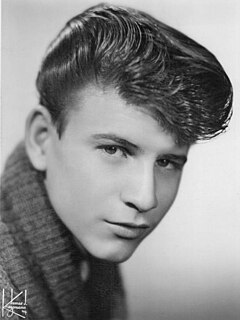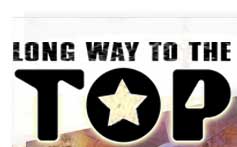Related Research Articles

Sugar Ray is an American rock band formed in Newport Beach, California, in 1986. Originally playing heavier nu metal style music, the band achieved mainstream popularity in 1997 with their more pop-influenced single "Fly". The song's success led the band to shift its style dramatically to the more radio-friendly pop sound with their subsequent releases. Their best-selling album, 14:59, was released in 1999, and featured popular singles "Every Morning", "Someday", followed by a self-titled album in 2001 featuring the single "When It's Over". The band would release two further albums, In the Pursuit of Leisure (2003) and Music for Cougars (2009), though the albums and respective singles generally sold far less. The band continued to tour into the 2010s.

Kenneth Ray Rogers was an American singer, songwriter, musician, actor, record producer, and entrepreneur. He was inducted into the Country Music Hall of Fame in 2013. Rogers was particularly popular with country audiences but also charted more than 420 hit singles across various genres, topping the country and pop album charts for more than 200 individual weeks in the United States alone. He sold more than 100 million records worldwide during his lifetime, making him one of the best-selling music artists of all time. His fame and career spanned multiple genres: jazz, folk, pop, rock, and country. He remade his career and was one of the most successful cross-over artists of all time.

The Kingsmen are a 1960s garage rock band from Portland, Oregon, United States. They are best known for their 1963 recording of Richard Berry's "Louie Louie", which held the No. 2 spot on the Billboard charts for six weeks and has become an enduring classic.
Patricia Ann Ruth Noble was an Australian singer and actress. Initially performing as Patsy Ann Noble, she was a teenage pop singer in the early 1960s, with regular appearances on the music and variety television series Bandstand. In November 1961, she released her biggest hit single, "Good Looking Boy", which reached the Top 10 in Melbourne and Top 20 in Sydney. At the 1961 Logie Awards, she won the 'Best Female Singer of the Year' award from TV Week. By 1962, she had transferred to the United Kingdom and continued her singing career by releasing singles there.

Bobby Rydell is an American singer, mainly of rock and roll music. In the early 1960s, he was considered a teen idol. His most well-known songs include "Wild One" and "Volare" (cover), and he appeared in the movie Bye Bye Birdie in 1963.

Patricia "Little Pattie" Thelma Thompson OAM is an Australian singer who performed as a teenage singer in 1960s surf pop and then in adult contemporary music. Her debut single from November 1963, "He's My Blonde Headed, Stompie Wompie, Real Gone Surfer Boy", achieved No. 2 chart success in Sydney and peaked at No. 19 on the national Kent Music Report. She appeared regularly on television variety programs, including Bandstand, and toured supporting Col Joye and the Joy Boys. Little Pattie was entertaining troops during the Vietnam War in Nui Dat, Vietnam, as an Australia Forces Sweetheart, when the nearby Battle of Long Tan began on 18 August 1966. In 1994 she received the Vietnam Logistic and Support Medal "in recognition of her services in support of the Australian Armed Forces in operations in Vietnam."

James Oswald Little, AO was an Australian Aboriginal musician, actor and teacher from the Yorta Yorta people and was raised on the Cummeragunja Reserve, New South Wales.

"Que Sera, Sera " is a song written by the team of Jay Livingston and Ray Evans that was first published in 1955. Doris Day introduced it in the Alfred Hitchcock film The Man Who Knew Too Much (1956), singing it as a cue to their onscreen kidnapped son. The three verses of the song progress through the life of the narrator—from childhood, through young adulthood and falling in love, to parenthood—and each asks "What will I be?" or "What lies ahead?" The chorus repeats the answer: "What will be, will be."

Long Way to the Top was a six-part weekly Australian Broadcasting Corporation (ABC) documentary film series on the history of Australian rock and roll, from 1956 to the modern era, it was initially broadcast from 8 August to 12 September 2001. One of its writers, James Cockington, provided a book tie-in, Long Way to the Top: Stories of Australian Rock & Roll (2001). Another series writer, and interviewer, Clinton Walker, compiled a 2-disc CD soundtrack album, Long Way to the Top: Original Soundtrack from the ABC-TV Series, by Various Artists, which featured in the show. It peaked at No. 9 on the ARIA Albums Chart. A year later a related national concert tour followed.
"Last Kiss" is a song released by Wayne Cochran in 1961 on the Gala label. It failed to do well on the charts. Cochran subsequently re-recorded his song for the King label in 1963. It was later revived by J. Frank Wilson and the Cavaliers, Pearl Jam and several international artists, including the Canadian group Wednesday, with varying degrees of success. The song was one of several teen tragedy songs from that period. The song's opening lyrics mirror the opening lyrics of Septimus Winner's "Der Deitcher's Dog".

"It's Only Make Believe" is a song written by drummer Jack Nance and Mississippi-born singer Conway Twitty, while both were touring across Ontario, Canada in 1958. The song was recorded on May 7 for MGM Records; produced by Jim Vienneau, it featured Floyd “Lightnin’” Chance on double bass. It was released on side B of "I'll Try" on July 14, 1958. Known as Harold Lloyd Jenkins until changing his name in 1957, Twitty was a relatively unknown rock n' roll singer at the time. That all changed when side B finally hit the chart in September, then made no. 1 twice, on November 10 and 24. The single topped both U.S. and the UK Singles Chart, and became the only #1 pop single of his career. Years later, on a segment of 'Pop Goes The Country', Twitty stated it was a hit in 22 different countries, and sold over 8 million copies. He did not become a country music star until he crossed over in 1966.
Judith Anne Stone AM is an Australian pop and country music singer. For much of the 1960s she was a regular performer on the music variety Bandstand, Stone's top 20 singles on the national charts are "I'll Step Down", "4,003,221 Tears from Now", "Born a Woman" and "Would You Lay with Me". On the Queen's Birthday Honours List of June 2006, Stone was awarded a Member of the Order of Australia, with the citation, "For service to the community as an entertainer at fundraising events for a range of charitable organisations, and as a singer."
"Mockingbird" is a 1963 song written and recorded by Inez and Charlie Foxx, based on the lullaby "Hush Little Baby".
John Howard Chester is an Australian singer-songwriter, who started his career in October 1959 with group The Jaywoods singing rock music and in 1969 changed to country music. He toured nationally with the Beatles, Roy Orbison, the Everly Brothers, Kenny Rogers, Johnny Cash, Tammy Wynette and Charley Pride. During his career he has led various groups including Johnny Chester and The Chessmen, Johnny Chester and Jigsaw, Johnny Chester and Hotspur. With Jigsaw he had five top 30 hit singles, "Gwen (Congratulations)" (1971), "Shame and Scandal", "Midnight Bus", "World's Greatest Mum" and "She's My Kind of Woman" (1974).

The Delltones were an Australian rock 'n' roll band, which formed in 1958. They started as a doo-wop, harmony quartet with Warren Lucas, Brian Perkins, Noel Widerberg and Ian "Peewee" Wilson. In June 1962 Noel Widerberg died in a car accident in Brighton-le-Sands in Sydney, and three weeks later the group's single, "Get a Little Dirt on Your Hands", reached the top five on the local charts. Widerberg's position was filled by Col Loughnan. The group disbanded in 1973.
Bryan Davies is a British-born Australian pop music singer and entertainer. He appeared on 1960s TV pop shows, Sing! Sing! Sing! and Bandstand. From March 1962, at age 17, he became the youngest person in Australia to host their own TV show, The Bryan Davies Show. The singer issued two albums, On My Way (1965) and Together by Myself (1968). His most popular singles were, "Dream Girl" and "Five Foot Two Eyes of Blue" (October), which both reached the top 4 on the Sydney charts.
"The Wedding", sometimes credited as "The Wedding ", is a popular song by Joaquin Prieto recorded by British singer Julie Rogers in 1964. The song was included on Rogers' extended play from 1964, which was also titled The Wedding, and has appeared on various compilation albums in the years since its release.

"Mainstreet" is a song written and recorded by Bob Seger & The Silver Bullet Band. It was released in April 1977 as the second single from the album Night Moves. The song peaked at number 24 on the U.S. Billboard Hot 100 and has since become a staple of classic rock radio. The song also reached number-one in Canada.

Digby George "Dig" Richards was an Australian rock and roll singer, songwriter, instrumentalist, musical theatre actor and television presenter, active during the late 1950s and early 1960s as lead singer with the R'Jays. Richards was the first Australian rock and roll artist to record a 12" LP record in Australia, with the self-titled album Dig Richards, released in November 1959. From 1971 he performed as a solo country music artist. According to the Kent Music Report he had four Top 30 national hit singles, "(My) Little Lover" / "Quarrels ", "A Little Piece of Peace", "People Call Me Country" / "The Dancer", and "Do the Spunky Monkey". On 17 February 1983 Digby Richards died of pancreatic cancer, aged 42. He was survived by his wife, Sue and two children.
"Surfin' U.S.A." is a song by the American rock band the Beach Boys credited to Chuck Berry and Brian Wilson. It is a rewritten version of Berry's "Sweet Little Sixteen" set to new lyrics penned by Wilson and an uncredited Mike Love. The song was released as a single on March 4, 1963, backed with "Shut Down". It was then placed as the opening track on their album of the same name.
References
- ↑ McGrath, Noel (1978). Noel McGrath's Australian Encyclopaedia of Rock. Outback Press. p. 166. ISBN 9780868882161.
- ↑ Baker, Ainslie (4 July 1962), "Singer makes mark as a composer", The Australian Woman's Weekly
- ↑ "Hits of the world", Billboard, 8 June 1963
- ↑ "Teacher breaks into TV as a pop singer", The Australian Woman's Weekly, 17 July 1963
- ↑ Hilder, George (23 November 1963), "Hope Tops Big TV Variety Show", Billboard
- ↑ "A guy with a real swing", Teenagers' Weekly (A Supplement to Australian Woman's Weekly), 22 November 1961
- ↑ Rogers, Bob (11 March 1964), "Little Pattie tries for second hit", The Australian Woman's Weekly
- ↑ Rogers, Bob (26 February 1964), "14-year-old hits the top", The Australian Woman's Weekly